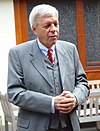Federal Ministry of Economics and Climate Protection
|
Federal Ministry of Economics and Climate Protection |
|
|---|---|
| state level | Federation |
| position | Supreme Federal Authority (as Federal Ministry ) |
| founding | October 23, 1917 as Reich Economic Office |
| Headquarters |
|
| authority management | Robert Habeck ( Bündnis 90/Die Grünen ), Federal Minister for Economic Affairs and Climate Protection |
| servants | 2187 (December 2020) |
| household volume | EUR 10.43 billion (2021) |
| web presence | www.bmwi.de |
The Federal Ministry of Economics and Climate Protection ( BMWK ) is a supreme federal authority in the Federal Republic of Germany . It has its headquarters or first office in Berlin and its second office in the Federal City of Bonn . The current head of the authority is the Federal Minister for Economics and Climate Protection Robert Habeck ( Greens ).
The authority was founded in 1949 as the Federal Ministry of Economics . With the appointment of the Merkel III cabinet , the Federal Ministry of Economics and Technology was renamed the Federal Ministry of Economics and Energy by virtue of an organizational decree on December 17, 2013 . After the appointment of Federal Chancellor Olaf Scholz on December 8, 2021 , he issued an organizational decree on the same day that the Federal Ministry for Economic Affairs and Energy be given the name Federal Ministry for Economic Affairs and Climate Protection . According to the decree, new responsibilities were transferred to the Federal Ministry of Economics and Climate Protection: responsibility for games from the division of the Federal Ministry for Digital Affairs and Transport and responsibility for climate protection , including European and international ones, from the division of the Federal Ministry for the Environment, Nature Conservation, Nuclear Safety and Consumer Protection Transfer references with the exception of international climate policy .
story
The forerunner of today's Federal Ministry of Economics and Climate Protection can be seen in the Reich Economic Office, founded in 1917 . This developed into the Reich Ministry of Economics in 1919 , which existed until 1945. The tasks were taken over from 1946 to 1949 by the administrative office for economy . After the Federal Republic was founded, the Federal Ministry of Economics existed from 1949 to 1998 . From May 1971 to December 1972 it was temporarily merged with the Federal Ministry of Finance to form the Federal Ministry of Economics and Finance. In 1998, the technology area was added from the research ministry, so that from then on it was called the Federal Ministry of Economics and Technology . Between 2002 and 2005 it was combined with parts of the previous Federal Ministry of Labor and Social Affairs to form the Federal Ministry of Economics and Labour . The federal government under Angela Merkel separated the two areas again in 2005 and renamed the ministry as the Federal Ministry of Economics and Technology . With the formation of the Merkel III cabinet on December 17, 2013, the ministry was renamed the Federal Ministry for Economic Affairs and Energy . With the formation of the Scholz cabinet on December 8, 2021, the ministry was renamed the Federal Ministry for Economic Affairs and Climate Protection .
In order to fulfill its tasks, the ministry is divided into nine departments and one central department .
- Central Department – Z
- Management and Planning Department - L
- European policy – E
- Economic policy - I
- Energy Policy - Heat and Efficiency - II
- Energy Policy – Electricity and Networks – III
- Industrial policy - IV
- Foreign Economic Policy – V
- Digital and innovation policy - VI
- SME policy – VII
The following changes were made compared to the Federal Ministry of Economics and Technology (2013): Individual IT policy issues were handed over to the Federal Ministry of Transport and Digital Infrastructure , which was also redesigned . The previous departments of communications and postal policy (VI) and technology policy (VII) were therefore combined in VI. The topic of energy policy was divided into departments II and III (previously III). Mittelstandspolitik was expanded to include responsibility for the new federal states, previously the Ministry of the Interior , and changed the numbering from II to VII.
Field Office
The headquarters of the Federal Ministry of Economics and Climate Protection is housed in a building complex consisting of the historic buildings of the former Kaiser Wilhelm Academy (Military Medical Academy) and the remains of the former Invalidenhaus , supplemented by some new buildings. The basic structure of the Invalidenhaus dates from the middle of the 18th century and was then outside the city. The building of the Kaiser Wilhelm Academy was erected around 1900.
As early as 1994, the former boarding school wing, which is particularly suitable as an office building, was restored and used by the ministry as the first construction phase. From July 1996 to December 2000, renovation work was carried out on the buildings under the direction of the architects Baumann and Schnittger, with the aim of restoring as much of the building's original condition as possible. The outer facades of the houses were therefore largely reconstructed and restored true to the original. The project costs of the 2nd construction phase amounted to 194.3 million euros.
authorities
Several federal offices are subordinate to the Ministry. This includes
- the Federal Cartel Office (BKartA), Bonn
- the Federal Network Agency for Electricity, Gas, Telecommunications, Post and Railways (BNetzA), Bonn
- the Federal Institute for Materials Research and Testing (BAM), Berlin
- the Physikalisch-Technische Bundesanstalt (PTB) with headquarters in Braunschweig and a second office in Berlin
- the Federal Institute for Geosciences and Natural Resources (BGR) with headquarters in Hanover and a second office in Berlin-Spandau
- the Federal Office of Economics and Export Control (BAFA) in Eschborn and Bochum as well
- Germany Trade and Invest (GTAI), which was integrated into the BMWi in Bonn in 2010.
funding programs
The Federal Ministry for Economic Affairs and Climate Protection subsidizes small and medium-sized enterprises (SMEs) as well as various universities and research institutions as part of various funding programs . Corresponding organizations can be supported by the programs “Mittelstand-Digital”, “go-digital”, “go-Inno”, “INNO-KOM” and “WIPANO”.
Mittelstand-Digital
"Mittelstand-Digital" informs small and medium-sized companies about the opportunities and challenges of digitization. Mittelstand 4.0 competence centers throughout Germany help with expert knowledge, demonstration centers, networks for exchanging experiences, events and practical examples. The Federal Ministry of Economics and Climate Protection enables free use of all Mittelstand-Digital offers.
go-digital
The "go-digital" funding is aimed at small and medium-sized companies in the commercial and craft sectors. Companies based in Germany and fewer than 100 employees can be funded with a 50% subsidy for the digitization of their processes. The program is divided into five different digitization aspects:
- digitization strategies
- IT security
- Digitized business processes
- data literacy
- Digital market development
This involves the optimization of business processes, the development of additional market shares and data protection against system failures and cybercrime . The relevant consulting firm , which is responsible for implementing the "go-digital" measures, is responsible for submitting the application for funding.
go-Inno
Small and medium-sized companies that deal with innovation development can be funded as part of the "go-Inno" program. In particular, small companies are addressed that lack up-to-date knowledge of methods and instruments to successfully manage internal product innovation or technical process innovation. Consulting services for the preparation and implementation of corresponding ideas are covered at 50% with the "go-Inno" funding. Corresponding organizations should strengthen their competitiveness through innovative product solutions.
INNO-COM
The "INNO-KOM-Ost" funding program was launched in 2009 due to the many structurally weak regions in Germany. The project was aimed at non-profit external industrial research institutions from East Germany, which researched innovation. Since January 1, 2017, the program has been used under the new name "INNO-KOM" in structurally weak regions throughout Germany. The respective institutions are funded in their research and development projects of preliminary research (VF) and market-oriented development (MF). The maximum funding is €550,000 and can also be applied for for investment measures to maintain the scientific and technical infrastructure.
WIPANO
In contrast to "go-Inno", the aim of the "WIPANO" funding program is not to promote the creation of innovations , but in particular to disseminate them through knowledge and technology transfer. On the one hand, "WIPANO - Knowledge and Technology Transfer through Patents and Standards" promotes the efficient protection and use of intellectual property of small and medium-sized enterprises. The program also supports the transfer of current research results into norms and standards . Universities and non-university research institutions receive the "WIPANO" funding of a maximum of 35% share financing for the identification, protection of intellectual property rights and the marketing of research results. SMEs, which have their research and development results for the first time through industrial property rights, or whose last property right application is more than five years ago, are also eligible. The amount of funding is 50% subsidy on eligible expenses and a maximum subsidy amount of €16,575.
Leap Innovation Agency
The BMWi, together with the Federal Ministry of Education and Research , is the customer for the Agency for Disruptive Innovation .
advisory boards
The ministry has a total of six advisory boards.
Scientific Advisory Board
The Scientific Advisory Board advises the Federal Minister on general questions of economic policy.
Advisory Board Young Digital Economy
The Young Digital Economy Advisory Board is a body of experts who advise the Federal Minister on economic policy issues in the context of digitization and the new economy . The Advisory Board, originally set up by Federal Minister Philipp Rösler in 2013 , meets several times a year and communicates the results of its deliberations in the form of expert statements, among other things.
In July 2021, the Advisory Board's call for "discipline of the press" to ensure "balanced reporting" in connection with IPOs caused criticism . The authors were Amorelie founder Lea-Sophie Cramer , investor Christoph Gerlinger from the German Startups Group and Alex von Frankenberg, managing director of High-Tech Gründerfonds. After the criticism, the “position paper on the subject of IPOs by German start-ups”, which contained this proposal, was withdrawn.
Other Advisory Boards
| Advisory Board | founding | task |
|---|---|---|
| SME Advisory Board | 1956 | Questions of commercial medium-sized businesses and the freelance professions |
| Tourism Advisory Board | 1977 | Tourism issues |
| Accreditation Advisory Board | 2010 | Accreditation questions according to the Accreditation Body Act |
| TTIP Advisory Board | 2014 | TTIP |
Federal Minister since 1949

| Surname | image | Political party | beginning of the term | end of term | Cabinet(s) | |
|---|---|---|---|---|---|---|
| Federal Minister of Economics | ||||||
|
Ludwig Erhard (1897-1977) |

|
independent | September 20, 1949 | October 16, 1963 |
Adenauer I Adenauer II Adenauer III Adenauer IV Adenauer V |
|
|
Kurt Schmuecker (1919–1996) |

|
CDU | October 17, 1963 | Nov. 30, 1966 |
Erhard I Erhard II |
|
|
Karl Schiller (1911-1994) |

|
SPD | December 1, 1966 | July 7, 1972 |
Kiesinger Brandt I |
|
|
Helmut Schmidt (1918-2015) |

|
SPD | July 7, 1972 | December 15, 1972 | Brandt I | |
|
Hans Friderichs (b. 1931) |

|
FDP | December 15, 1972 | October 7, 1977 |
Brandt II Schmidt I Schmidt II |
|
|
Otto Graf Lambsdorff (1926-2009) |

|
FDP | October 7, 1977 | September 17, 1982 |
Schmidt II Schmidt III |
|
|
Manfred Lahnstein (b. 1937) |

|
SPD | September 17, 1982 | October 1, 1982 | Smith III | |
|
Otto Graf Lambsdorff (1926-2009) |

|
FDP | October 4, 1982 | June 27, 1984 |
Cabbage I Cabbage II |
|
|
Martin Bangeman (* 1934) |

|
FDP | June 27, 1984 | December 9, 1988 |
Cabbage II Cabbage III |
|
|
Helmut Haussmann (b. 1943) |

|
FDP | December 9, 1988 | January 18, 1991 | cabbage III | |
|
Jürgen Möllemann (1945–2003) |

|
FDP | January 18, 1991 | January 21, 1993 | Cabbage IV | |
|
Günter Rexrodt (1941–2004) |
FDP | January 21, 1993 | October 26, 1998 |
Cabbage IV Cabbage V |
||
| Federal Minister for Economics and Technology | ||||||
|
Werner Mueller (1946–2019) |

|
independent | October 27, 1998 | October 22, 2002 | Schroeder I | |
| Federal Minister for Economics and Labour | ||||||
|
Wolfgang Clement (1940–2020) |

|
SPD | October 22, 2002 | November 22, 2005 | Schroeder II | |
| Federal Minister for Economics and Technology | ||||||
|
Michael Glos (born 1944) |

|
CSU | November 22, 2005 | February 10, 2009 | Merkel I | |
|
Karl Theodor zu Guttenberg (* 1971) |

|
CSU | February 10, 2009 | October 28, 2009 | Merkel I | |
|
Rainer Bruederle (* 1945) |

|
FDP | October 28, 2009 | May 12, 2011 | Merkel II | |
|
Philipp Rösler (* 1973) |

|
FDP | May 12, 2011 | December 17, 2013 | Merkel II | |
| Federal Minister for Economics and Energy | ||||||
|
Sigmar Gabriel (born 1959) |

|
SPD | December 17, 2013 | January 27, 2017 | Merkel III | |
|
Brigitte Zypries (* 1953) |

|
SPD | January 27, 2017 | March 14, 2018 | Merkel III | |
|
Peter Altmaier (* 1958) |

|
CDU | March 14, 2018 | December 8, 2021 | Merkel IV | |
| Federal Minister for Economics and Climate Protection | ||||||
|
Robert Habeck (born 1969) |

|
Green | December 8, 2021 | in office | scholz | |
Parliamentary State Secretaries
- 1967–1970: Klaus Dieter Arndt ( SPD )
- 1970-1971: Philip Rosenthal (SPD)
- 1972: Rainer Offergeld (SPD)
- 1972–1987: Martin Grüner ( FDP )
- 1983–1987: Rudolf Sprung ( CDU )
- 1987-1989: Ludolf-Georg von Wartenberg (CDU)
- 1987-1993: Erich Riedl ( CSU )
- 1989-1992: Klaus Beckmann (FDP)
- 1992-1998: Heinrich Leonhard Kolb (FDP)
- 1993-1994: Reinhard Göhner (CDU)
- 1994-1997: Norbert Lammert (CDU)
- 1998-2002: Siegmar Mosdorf (SPD)
- 2001–2002: Margareta Wolf ( GREENS )
- 2002-2005: Gerd Andres (SPD)
- 2002-2005: Rezzo Hose (GREEN)
- 2002-2005: Ditmar Staffelt (SPD)
- 2005-2009: Dagmar Woehrl (CSU)
- 2005-2009: Hartmut Schauerte (CDU)
- 2005-2013: Peter Hintze (CDU)
- 2009-2013: Ernst Burgbacher (FDP)
- 2009-2013: Hans-Joachim Otto (FDP)
- 2013-2017: Brigitte Zypries (SPD)
- 2013-2018: Uwe Beckmeyer (SPD)
- 2013-2018: Iris Gleicke (SPD)
- 2017-2018: Dirk Wiese (SPD)
- 2018-2019: Oliver Wittke (CDU)
- 2018-2020: Christian Shepherd (CDU)
- 2018-2021: Thomas Bareiß (CDU)
- 2019-2021: Elisabeth Winkelmeier-Becker (CDU)
- 2020-2021: Marco Wanderwitz (CDU)
- since 2021: Franziska Brantner (Greens)
- since 2021: Michael Kellner (Green Party)
- since 2021: Oliver Krischer (Greens)
Official Secretaries of State
- 1949-1951: Eduard Schalfejew
- 1951-1963: Ludger Westrick
- 1958–1963: Alfred Müller-Armack ( CDU )
- 1963-1966: Wolfram Langer
- 1963-1968: Fritz Neef
- 1967-1972: Johann Baptist Schöllhorn
- 1968–1969: Klaus von Dohnanyi ( SPD )
- 1969-1978: Detlev Rohwedder (from 1971 SPD)
- 1972: Ernst Wolf Mommsen
- 1973-1991: Otto Bad
- 1979-1995: Dieter von Würzen
- 1991-1994: Johann Eekhoff
- 1994-1997: Johannes Ludewig
- 1995-1998: Lorenz Schomerus
- 1997-1998: Rudi Geil (CDU)
- 1997-1998: Klaus Bünger
- 1998-2004: Alfred Tacke (SPD)
- 1999-2003: Axel Gerlach
- 2002-2005: Rudolph Anzinger
- 2002-2006: Georg-Wilhelm Adamowitsch (SPD)
- 2004-2011: Bernd Pfaffenbach
- 2005-2008: Joachim Wuermeling ( CSU )
- 2006-2009: Walther Otremba
- 2008-2012: Jochen Homann
- 2009-2014: Bernhard Heitzer ( FDP )
- 2011-2014: Stefan Kapferer (FDP)
- 2012-2014: Anne Ruth Herkes
- 2014-2017: Rainer Sontowski (SPD)
- 2014–2018: Rainer Baake ( Greens )
- 2014-2018: Matthias Machnig (SPD)
- 2018-2021: Ulrich Nussbaum
- 2018-2021: Claudia Dörr-Voss
- 2019-2021: Andreas Feicht (CDU)
- since 2021: Anja Hajduk (Greens)
- since 2021: Sven Giegold (Greens)
- since 2021: Udo Philipp (Greens)
- since 2021: Patrick Graichen
See also
web links
itemizations
- ↑ BMWi-Employees. Retrieved 23 May 2021 .
- ↑ Federal budget. Retrieved 23 May 2021 .
- ↑ Domestic protocol of the federal government, list of federal ministries , retrieved on January 12, 2022.
- ↑ Federal Republic of Germany - The Federal Chancellor: Organization Decree. In: bundesregierung.de. December 8, 2021, retrieved December 9, 2021 .
- ↑ Organization Chart. (PDF) Federal Ministry for Economic Affairs and Energy, May 1, 2014, retrieved September 21, 2014 .
- ^ " Organiserlass 2013 ". Federal Ministry of Justice and Consumer Protection, December 17, 2013, retrieved on March 2, 2018 .
- ↑ Hagen Eying, Alexander Kluy, Gina Siegel (editors): Democracy as a builder. Federal buildings in Berlin from 1991 to 2000 . Publisher: Federal Ministry of Transport, Building and Housing. 1st edition. Junius Verlag, Hamburg 2000, ISBN 3-88506-290-9 , p. 248-261 .
- ↑ Federal Ministry for the Environment, Nature Conservation, Building and Nuclear Safety Construction of the Federal Ministry of Economics and Technology
- ↑ Mittelstand-Digital official website. Retrieved October 21, 2020 .
- ↑ Federal Ministry for Economic Affairs and Energy (BMWi): go-digital. May 2018, retrieved April 4, 2019 .
- ↑ go-digital. Retrieved April 4, 2019 .
- ↑ BMWi funding program go-digital. March 7, 2019, retrieved April 4, 2019 .
- ↑ go-Inno. Retrieved April 4, 2019 .
- ↑ INNO-KOM. Retrieved April 4, 2019 .
- ↑ WIPANO. Retrieved April 4, 2019 .
- ↑ Advisory councils on the side of the ministry
- ↑ Advisory Board "Young Digital Economy", as of: February 2020 Retrieved on February 14, 2020.
- ↑ Rösler gets advice from startups, as of: January 2013 Retrieved on February 14, 2020.
- ↑ Altmaier in the Handelsblatt: The second wave of digitization is Europe's opportunity, as of: October 2019 Retrieved on February 14, 2020.
- ↑ Special meeting of the advisory board "Young digital economy, as of: March 2019 Retrieved on February 14, 2020."
- ↑ Young digital economy: Due to IPO lull: Advisory council of the federal government calls for "discipline of the press". Retrieved 13 July 2021 .
- ↑ Ludwig Erhard was apparently made Chancellor without a party . In: Die Welt , November 16, 2011. See also the article by Ludwig Erhard
Coordinates: 52°31′46.3″ N , 13°22′25.3″ E




